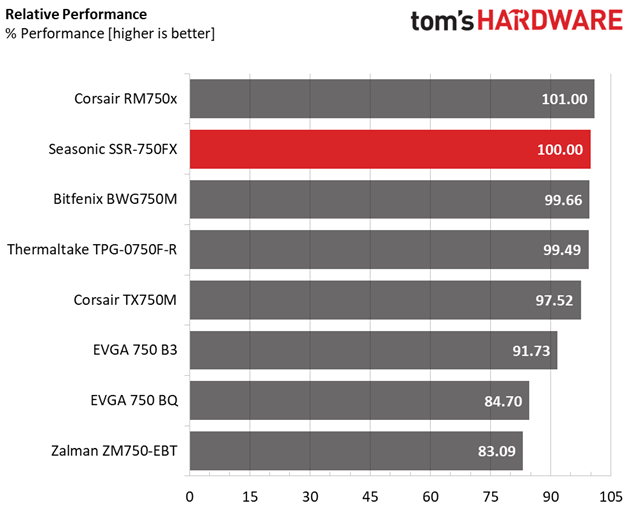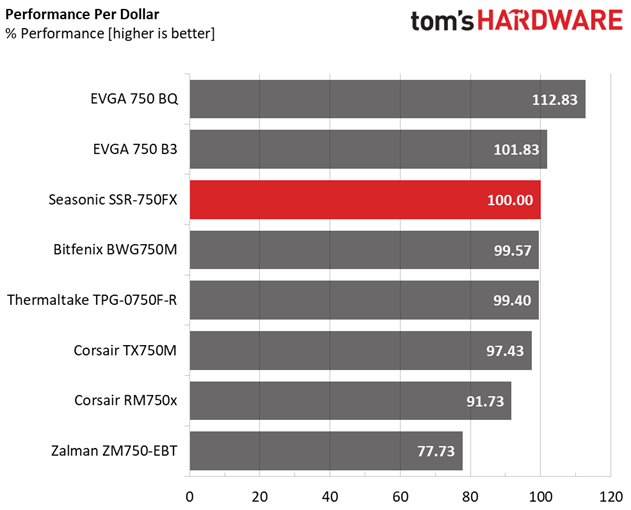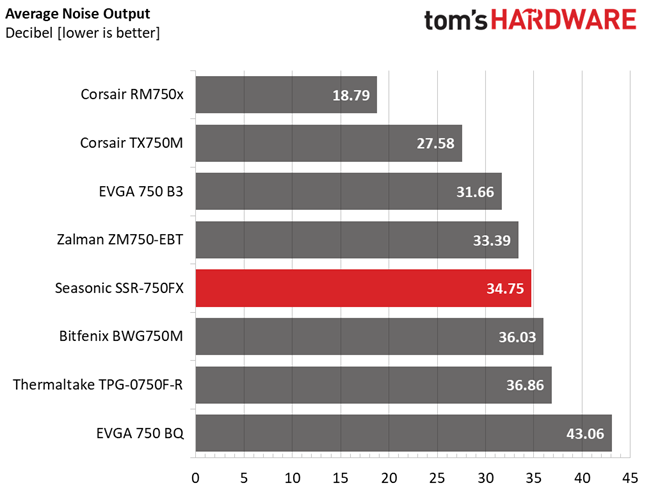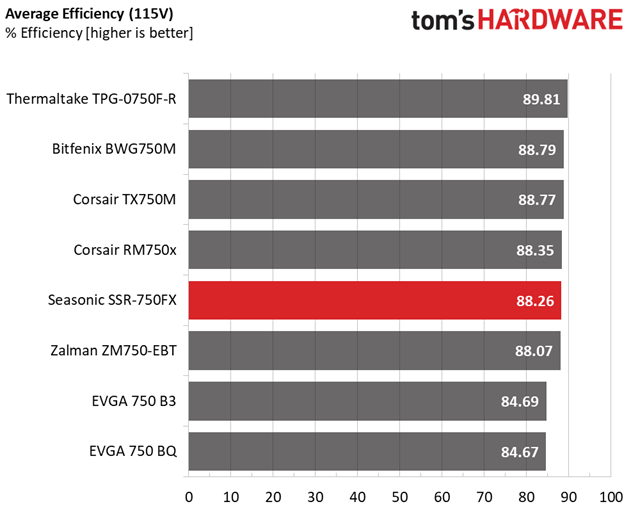Seasonic Focus Plus 750 Gold PSU Review
Why you can trust Tom's Hardware
Performance, Value, Noise & Efficiency
Performance Rating
The following graph shows the SSR-750FX's total performance rating, comparing it to other units we have tested. To be more specific, the tested unit is shown as 100 percent, and every other unit's performance is shown relative to it.
Thanks to tight load regulation, a long hold-up time, and good ripple suppression, the SSR-750X comes close to Corsair's excellent RM750x, which costs around $10 more and has larger dimensions. If the 3.3V rail's transient response was better, Seasonic's offering would achieve an even higher performance score.
Performance Per Dollar
The following chart may be the most interesting to many of you because it depicts the unit's performance-per-dollar score. We looked up the current price of each PSU on popular online shops and used those prices and all relative performance numbers to calculate the index. If the specific unit wasn't available in the United States, we searched for it in popular European Union shops, converting the listed price to USD (without VAT). Note that all of the numbers in the following graph are normalized by the rated power of each PSU.
Seasonic employs aggressive pricing. With a $100 price tag, the SSR-750FX scores well on this chart.
Noise Rating
The graph below depicts the cooling fan's average noise over the PSU's operating range, with an ambient temperature between 30°C and 32°C (86°F to 89.6°F).
This is where the SSR-750FX falls behind its competition. An aggressive fan profile results in quite a bit of noise, whereas Corsair's RM750x, one of the quietest 750W PSUs, is far superior.
Efficiency Rating
The following graph shows the average efficiency of the PSU throughout its operating range, with an ambient temperature close to 30°C.
Get Tom's Hardware's best news and in-depth reviews, straight to your inbox.
The average efficiency results, which are based on thousands of different load combinations, put the SSR-750X close to the RM750x. Only the Thermaltake Toughpower Grand RGB 750W is notably above the rest of the pack.
MORE: Best Power Supplies
MORE: How We Test Power Supplies
MORE: All Power Supply Content
Current page: Performance, Value, Noise & Efficiency
Prev Page Ripple Measurements Next Page Final Analysis
Aris Mpitziopoulos is a contributing editor at Tom's Hardware, covering PSUs.
-
none77 Thank you for the detailed review.Reply
In the transient response test
Advanced Transient Response at 50 Percent – 200ms
the +3.3 pass.
-
BugariaM As always, here are the most detailed reviews on the PSU.Reply
Thank you and keep it up!
The only thing that is not quite clear to me. What is the criterion for voltage drop in % to get PASS/FAIL in "Advanced Transient Response Tests"?
You declare that:
"In all tests, we measure the voltage drops." The voltages should remain within the ATX specification's regulation limits. "
For ATX 2.2 we have:
12v - 10%
5v - 5%
3.3v - 5%
5VSB - 5%
However, looking at your reviews, there are often situations where, at <5%, the power supply gets the FAIL mark and vice versa, some at >5% receive PASS
Why is this happening? -
Aris_Mp the limit is 5% however the voltage rails of the PSUs' under test in the majority of cases aren't at the nominal voltages, but higher, so even with 5% deviation voltages go don't bellow the limits that the ATX spec sets (11.4V, 4.75V, 3.14V). Only if a rail goes below those voltage levels it fails. The 5% is just an indication that the ATX provides to specify the voltages above.Reply -
fredlaso Dell Inspiron 5675 Desktop, PSU (power supply unit), upgrade. Would this PSU compatible with Dell Inspiron 5675 Desktop. It came with 460W I would like to replace it with PSU between 650 to 750W. I tried at Dell forums but cannot get a clean link which one would be compatible.Reply
I would greatly appreciate if someone could help me out. Thank you kindly in advance:
http://en.community.dell.com/support-forums/desktop/f/3514/t/20019321?pi21953=1#21018407
http://en.community.dell.com/support-forums/desktop/f/3514/p/20024419/21031446#21031446
System Comp,:
Compatible Power Supply needed for Inspiron 5675 Gaming Power Supply
Specs:
AMD Ryzen 7 1700X 3.4GHz Octa-Core Processor
8GB 2400MHz DDR4 RAM
1TB 7200 RPM Hard Drive
AMD Radeon RX 580 8GB GDDR5 Graphics Card
DVD+RW Drive
Dual Band WiFi 802.11ac + Bluetooth 4.1
Windows 10 Home (64-bit)
460 Watt Power Supply w/ Polar Blue LED
Includes: Dell KB216 Wired Keyboard + Dell MS116 Wired Mouse
Ports:
6x USB 3.0
1x USB 3.1 Type-C Gen 1
2x USB 2.0
1x Audio Combo Jack
1x 3-in-1 Media Card Reader
1x P/S 2
1x 7.1 Channel Audio Out
Expansion Slots:
3x 3.5" bay
2x 2.5" bay
2x PCIe x1
2x PCIe x16
http://en.community.dell.com/support-forums/desktop/f/3514/t/20019321?pi21953=1#21018407
http://en.community.dell.com/support-forums/desktop/f/3514/p/20024419/21031446#21031446 -
paulinosaka My Seasonic Platinum began failing under load after only 10 months. Paid cash here in Japan at Joshin - couldnt find reciept - honestly never thought I would need it ever. Seasonic would not help me.?Reply
REPLY



